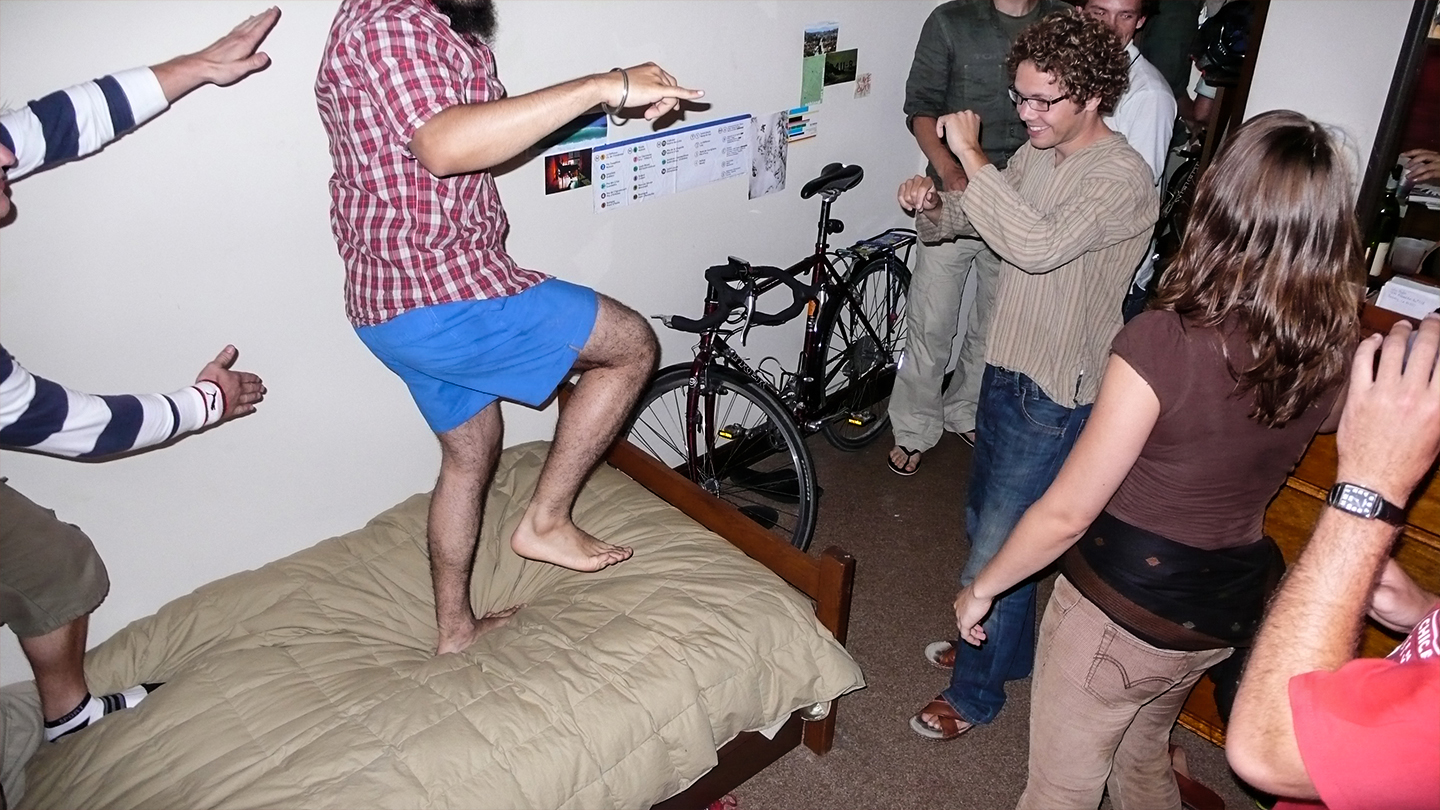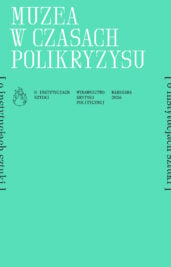Kilka lat temu byłem na kawalerskim kolegi ze studiów, który zorganizowaliśmy na krakowskim Kazimierzu. Wynajęliśmy przestronny apartament przez którąś z aplikacji w jednej ze starych, ale dobrze utrzymanych kamienic. Impreza ogólnie się udała, ale gdy na drugi dzień roześmianą gromadką opuszczaliśmy budynek, piętro niżej mijaliśmy starszą panią, która właśnie wchodziła do swojego mieszkania. Na moment odwróciła głowę i spojrzała na nas z niezwykle wyrazistą mieszaniną strachu i pogardy.
Wyraz jej twarzy był tak dobitny, że wytłumaczył mi prawdziwą istotę najmu krótkoterminowego znacznie lepiej niż raporty, dane i badania. Dzięki starszej pani z krakowskiego Kazimierza przez dłuższą chwilę miałem uzasadnione wrażenie bycia składnikiem niezwykle toksycznej receptury, która zatruwa życie zwyczajnym mieszkańcom okupowanych przez turystów oraz imprezowiczów budynków mieszkalnych.
Hossa kolejnego wypaczenia
Najem krótkoterminowy jest toksyczny na wielu polach. Obniżanie komfortu życia stałych mieszkańców pojedynczych budynków czy nawet całych dzielnic, którzy muszą użerać się co weekend z obcymi typami na bani, to tylko jeden z nich. Ale być może najważniejszy, gdyż uderza w jedną z kluczowych potrzeb człowieka, czyli w poczucie bezpieczeństwa.
Gdy w mojej katowickiej wspólnocie mieszkaniowej jacyś obcy ludzie kręcili się po którejś klatce schodowej, na grupie facebookowej momentalnie pojawiały się interwencyjne posty w tej sprawie i rozpoczynała się ożywiona dyskusja – kto i jakim prawem ich tu wpuścił, następnym razem trzeba będzie ich psami poszczuć, albo przynajmniej potraktować gazem po oczach.
Tymczasem mieszkańcy popularnych turystycznie miast i dzielnic muszą się regularnie mordować z falami obcych ludzi, którzy pojawiają się na kilka dni, by potem już tam nigdy nie wrócić. Co gorsza, ci nieproszeni goście funkcjonują zwykle w trybie imprezowo-rekreacyjnym, który jest średnio kompatybilny z codzienną rutyną pozostałych użytkowników budynku.
Poza tym najem krótkoterminowy jest kolejnym już wypaczeniem rynku mieszkaniowego. Pierwotną istotą tego ostatniego była sprawna i efektywna ekonomicznie alokacja zasobów lokalowych w celu zaspokajania potrzeb mieszkaniowych ludności. Według dobrze znanej liberalnej mantry, że sektor prywatny wypełni to zadanie znacznie lepiej niż urzędnicy, którzy pogubią dokumenty, zasypią człowieka niepotrzebną biurokracją i jeszcze 20 proc. rozkradną.
I gdyby rynek mieszkaniowy funkcjonował w ten właśnie sposób, że prywatne podmioty dostarczają ludności za opłatą mieszkania własnościowe lub wynajmowane, to byłoby już nawet pół biedy. Problem w tym, że od tamtego czasu rynek mieszkaniowy zaczął spełniać szereg innych, tym razem już szkodliwych dla większości funkcji.
Najpierw lokale zaczęły być traktowane jako aktywa inwestycyjne, czyli zaczęto je nabywać nie w celach mieszkaniowych, ale w nadziei czerpania renty ze wzrostu ich cen. Flipperzy, którzy wyszukują bardzo atrakcyjne cenowo oferty, by odsprzedać lokum z zyskiem czasem już po kilku tygodniach, to jeden z późniejszych objawów tej choroby.
Jeszcze później okazało się, że nieruchomości mieszkalne mogą być nie tylko towarem lub aktywem inwestycyjnym, ale też nawet usługą. Coś jak abonament na dostęp do gier w Game Passie Xboxa albo streaming muzyki ze Spotify. Potrzebujesz lokalu na kilka dni w centrum Barcelony? Proszę bardzo, po co będziesz przepłacał za jakieś hotele i te wszystkie recepcjonistki, sprzątaczki czy ochroniarzy. Niech pójdą do jakiejś normalnej roboty, z Excelem, cyferkami i targetami do wyrobienia.
Ten rodzaj usług bije kolejne rekordy popularności. Nic dziwnego, dla krótkoterminowych użytkowników to bardzo wygodna i tania opcja. W całej UE liczba nocy spędzanych w lokalach najmowanych przez aplikacje z każdym rokiem systematycznie rośnie. Według Eurostatu w sierpniu 2019 roku goście takich „współdzielonych” mieszkań spędzili w nich łącznie ponad 90 mln nocy. W zeszłym roku było to już ponad 120 mln. Wzrost o jedną trzecią w ciągu kilku lat pokazuje, że branża najmu krótkoterminowego przeżywa prawdziwą hossę.
Polska powinna inspirować się Berlinem
W Polsce rynek usług mieszkaniowych wciąż jest tak naprawdę jeszcze w powijakach – przynajmniej na tle gigantów z Europy Południowej. W okresie lipiec–wrzesień 2023 roku w Andaluzji spędzono 14 mln nocy w lokalach subskrybowanych od którejś z popularnych platform. Na chorwackim wybrzeżu Adriatyku nawet 24 mln nocy. W Katalonii było to 9,5 mln, a w Toskanii i francuskim regionie stołecznym po 6,5 mln.
Polscy rekordziści to województwo pomorskie z Trójmiastem oraz Małopolska z Krakowem, w których goście spędzili po niespełna 3 mln nocy w lokalach z platform podobnych do Airbnb.
Polska nie jest przesadnie popularną destynacją turystyczną, więc i korzystanie z Airbnb jest tutaj rzadsze. Jak na razie, gdyż zmieniający się klimat, rosnąca zamożność i prestiż kraju oraz stopniowo wzrastający zasób mieszkań premium będzie sprzyjać napływowi użytkowników tego typu platform.
Według danych Renters.pl liczba apartamentów wynajmowanych na krótki okres w Polsce to ok. 60 tys., a co roku zwiększa się ona o kolejnych kilka tysięcy. W kolejnych 2–3 latach tempo postępowania choroby będzie się utrzymywać na podobnym poziomie. Szczególnie że pojawia się coraz więcej klientów premium, którzy są w stanie „dać wyższe stopy zwrotu”.
Rośnie też liczba gości oraz spędzonych przez nich nocy. Jeśli chodzi o wzrost popularności tej formy rekreacyjnej akomodacji, Polska jest już jednym z europejskich liderów. W trzecim kwartale zeszłego roku w całej Polsce spędzono 13,5 mln nocy w lokalach z aplikacji, co na tle 65 mln we Francji i 55 mln w Hiszpanii nie robi wrażenia. Jednak dane dla Polski oznaczają tym samym wzrost aż o 25 proc. rok do roku. Tymczasem w całej UE popularność najmu krótkoterminowego wzrosła „tylko” o 14 proc. Dzielnie gonimy więc Zachód również w tym, czego akurat lepiej byłoby nie powielać.
Dynamikę tego „postępu” widać także w tegorocznym badaniu przeprowadzonym na zlecenie warszawskiego magistratu. Ogólnie rzecz biorąc, w każdej dzielnicy odsetek lokali przeznaczanych na najem krótkoterminowy jest niższy od 2 proc., nie licząc Śródmieścia, gdzie jest to ok. 4 proc.
Jednak udział tego typu lokali w nowo oddawanych mieszkaniach jest zdecydowanie wyższy. W zeszłym roku w całej Warszawie na sto nowych mieszkań pojawiało się 20 nowych ofert na platformach najmu. Teoretycznie więc co piąte nowe mieszkanie w stolicy może trafiać na rynek najmu krótkoterminowego. Na Woli nawet dwie trzecie, a na Pradze Północ co trzecie.
Ekspansja tego typu lokali powoduje szereg problemów na rynku mieszkaniowym. Przede wszystkim wypychają one tradycyjny najem długoterminowy. W badaniu The Airbnb rent premium and the crowding-out of long-term rentals z 2023 roku autorzy wykazali, że liczba ofert zamieszczanych na platformach jest powiązana z wyższym wskaźnikiem pustostanów. Tak więc przez większość czasu te lokale stoją nieużywane, zamiast zaspokajać potrzeby lokalne. Opowieści o sprawnej alokacji zasobów przez nieuregulowane rynki można włożyć między bajki.
Autorzy artykułu When Airbnb Listings in a City Increase, So Do Rent Prices zamieszczonego na łamach Harvard Business Review w 2019 roku w swoim badaniu wykazali, że jednoprocentowy wzrost liczby ofert na Airbnb jest przyczynowo powiązany ze wzrostem stawek wynajmu o 0,02 proc. i wzrostem cen nieruchomości o niespełna 0,03 proc. „Chociaż te efekty mogą wydawać się bardzo małe, trzeba wziąć pod uwagę, że średni wzrost ofert na Airbnb wynosi około 44 proc. rok do roku” – zaznaczyli badacze.
Równocześnie są dowody na to, że można z tym zjawiskiem skutecznie walczyć. Tak zrobił Berlin, w którym na dwie tury wprowadzono restrykcje daleko ograniczające liczbę ofert najmu krótkoterminowego. W tegorocznym badaniu Airbnb and rental markets: Evidence from Berlin naukowcy dowiedli, że wprowadzone w 2016 i 2018 roku przepisy doprowadziły do masowego wycofywania ofert na platformie Airbnb dla Berlina. Tylko w trzech miesiącach poprzedzających wejście w życie reformy w 2016 roku zniknęło ich ok. 4 tys.
W 2016 roku weszło w życie prawo, według którego każde mieszkanie w najmie krótkoterminowym musi uzyskać specjalne pozwolenie od miasta. W 2018 roku doprecyzowano przesłanki, które należy spełnić, by dostać takie zezwolenie, a ponadto wprowadzono wymóg publikacji przy każdej ofercie numeru rejestracyjnego, który każdy z takich lokali otrzymywał od urzędu.
Dzięki temu skala tego zjawiska w stolicy Niemiec jest relatywnie niewielka. Według Eurostatu w okresie lipiec–wrzesień 2023 roku w Berlinie zanotowano niespełna 900 tys. nocy w ramach usług typu Airbnb – to ponad dwukrotnie mniej niż w pobliskich Meklemburgii (2 mln nocy) i Zachodniopomorskim (2,3 mln).
Prześladowania przedsiębiorców z Airbnb
Drastyczne ograniczenie najmu krótkoterminowego to nie jest więc żadna wielka filozofia, tylko kwestia decyzji politycznej. Ministra funduszy i polityki regionalnej Katarzyna Pełczyńska-Nałęcz zapowiedziała wprowadzenie ograniczeń, wśród których najpierw znajdzie się rejestracja wszystkich tego typu lokali, co umożliwi następnie diagnozę problemu, wprowadzenie niesprecyzowanych jeszcze rozwiązań podatkowych oraz rozliczanie właścicieli z ich nowych obowiązków.
Gdyby uzyskanie takiego wpisu do rejestru wymagało wcześniejszej zgody wspólnoty lokalnej, obwarowanej szeregiem kryteriów, to liczba wynajmowanych w ten sposób lokali zapewne znacząco by spadła. Dodatkowe opodatkowanie mieszkań, które przez większość czasu stoją puste, skłoniłoby natomiast ich właścicieli do poszukania stałych najemców.
Od deklaracji do realizacji jednak daleka droga. Szczególnie przy obecnym rządzie, który po roku od wyborów nie wprowadził jeszcze dokładnie żadnych istotnych zmian ustawowych, a w koalicji – a nawet w samym klubie poselskim ministry Pełczyńskiej-Nałęcz – znajdzie się sporo obrońców „ciemiężonych przedsiębiorców” z Airbnb.

 Wspieraj
Wspieraj 

 Wspieraj
Wspieraj  Wydawnictwo
Wydawnictwo 
 Przekaż
Przekaż 
















